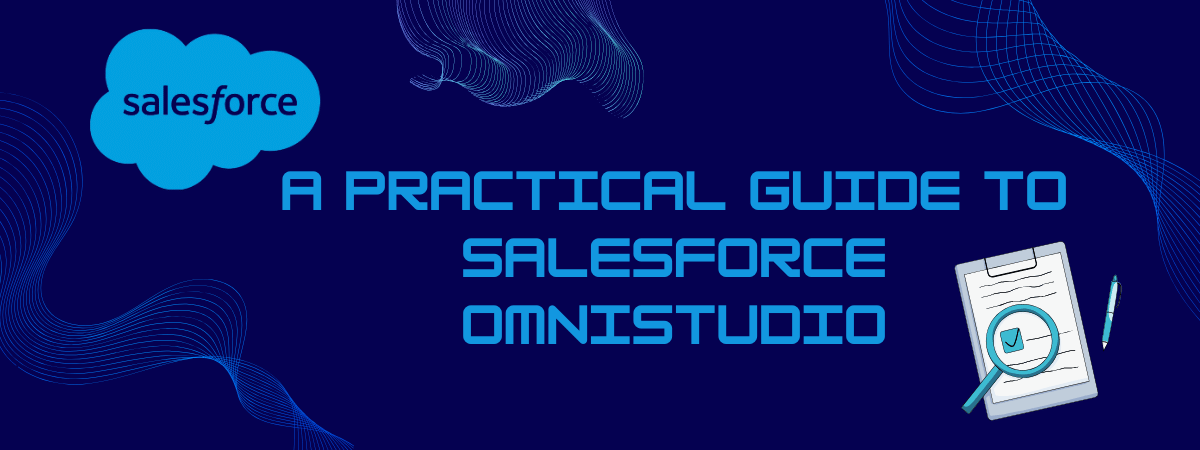Top 5 Contract Automation Tools Compared: Features, Pricing, and User Reviews
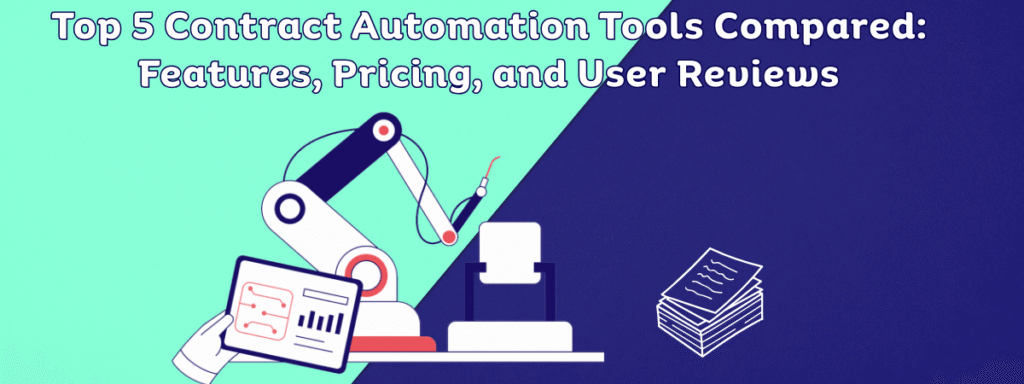
If an average Joe working with contracts were to go to the office, he would see maybe three urgent contract reviews, a vendor agreement, and one or two renewals. On a Monday morning, does anyone really want to read through an email chain with seventeen people debating clause language that should’ve been standardized months ago?
This reminds me of a case study I came across a while back. In it, a Cloud content management and file-sharing service was struggling with non-disclosure agreements. With CLM software, the business was able to streamline the entire contract lifecycle through standardized templates and tailored clauses offered by the solution.
Standardized clauses and templates matter! Look at our insights on the top ten legal document generator software.
Does managing hundreds of NDAs or more than 500+ contracts annually across multiple departments sound familiar to you? This is not just a problem for you, but rather something many people experience. This story mirrors the struggles of hundreds of businesses, and you may be one of them, too.
You would’ve heard how contract automation software would change everything, bringing much-needed relief. Of course, not many would tell you the reality is more nuanced than just that. Investing in just about any solution may not necessarily address the real challenges legal teams are grappling with; rather, organizations need to identify their pain points and find a platform that truly fits their needs.
Why Contract Generators Just Don’t Cut It?
The online space is filled with contract generators, or rather to be specific contract drafting tools; one might assume that they generate contracts and should do just fine. Unfortunately, that is not the case. These free tools rely on rigid templates. Can these basic generators produce documents that require in-depth knowledge and multiple revisions?
Look at our post that fives in the challenges, use cases, and choosing a tailored solution.
It doesn’t just end there; consider other limitations, like security and compliance gaps. Would you be comfortable with putting sensitive contract information at risk? If you’re in regulated fields like healthcare or finance, using unsecured contract generator tools can result in violations that cost you way more than they would if you invested in proper software.
Then comes the bigger issue: can online contract drafting tools really give you the holistic growth that your business needs? Can they scale with you as your business grows? When it comes to the reviewing phase, there are more challenges, there’s too much information, improper visibility, and versioning for the various stakeholders involved, and an evident lack of audit trails.
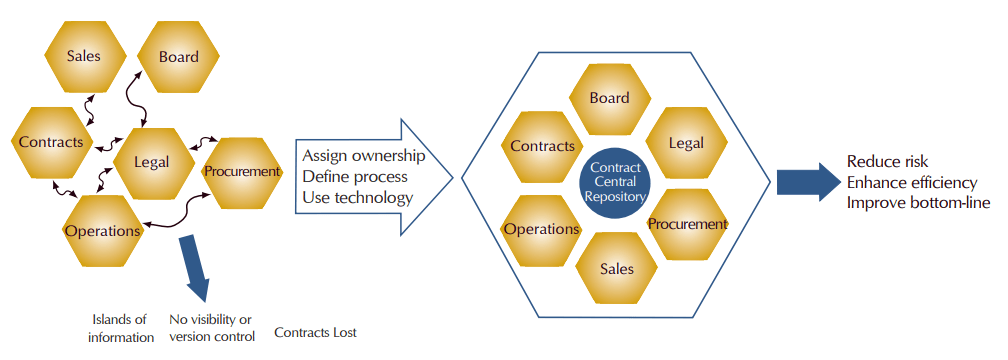
Did you know?
An IACCM survey revealed that out of 100 Global 2000 companies, 81% of companies report that just locating a contract is problematic.
Most Common Risks Caused by Bad Contract Management
Earlier, we saw why contract generators aren’t enough; however, let me lay out the risks inherent to bad contract management.
- Even the most thoroughly checked contracts might be lacking critical terms.
- Sometimes, there’s a very high possibility of you undercharging your customers. Likewise, there’s a very high possibility of your vendors overcharging you.
- Your time and productivity are typically wasted.
- What happens when key employees leave? You lose key knowledge with them.
- Obviously, poor contract management means compromised customer loyalty.
Top 5 Contract Automation Software
Perfect Doc Studio
Perfect Doc Studio can generate contracts, automate workflows, and includes features that make it a good solution for your legal documentation’s pain points. It may not have been on the market as long as some established options, but that’s what makes PDS stand out. PDS’s team has equipped it with technology, including a drag-and-drop interface, reusable sections, a no-code platform, and everything you need to make your contract automation process a breeze.
PDS’s unique framework makes it suitable for both legal and commercial teams to create, execute, and manage contracts more easily and quickly than most traditional tools in the market. And have I mentioned that it is an affordable tool? PDS will cost you only $0.008 per page.
A breakdown of how Perfect Doc Studio Works
Step 1: With PDS, you can use one of the hundreds of available templates or create your own. Creating an intelligent document template is easier than ever before with the intuitive online editor. If you have an existing DOCX or fillable PDF file, you can upload it and PDS will change it into an dynamic template.
Step 2: All you have to do is insert template variables and assign each variable a label (for instance: “Client Name”, “Contract Date”), and these fields will automatically pull in the data.
Next, you could use conditional logic to adjust your document’s content, and loops can help you list multiple items, such as deliverables or fees.
Step 3: Connecting your data is simple with PDS’s integration engine, you could use a simple google form, CSV, Excel file or any other data source. PDS merges the data into your template to create a personalized document.
Step 4: Finally, all that’s left is to specify the recipient details and message content so Perfect Doc Studio can send documents directly to clients. They’re automatically delivered based on your workflow setup.
Here are Perfect Doc Studio’s features that lawyers and business teams find particularly helpful
Perfect Doc Studio comes with a varied template library. With an intuitive template designer, you can either create and use reusable sections like provisions for Warranties and Disclaimers or reusable pages like standard clauses covering Termination, Confidentiality, Indemnification, and Dispute Resolution.
The drag-and-drop designer works not just on templates like in most legal contract automation tools, but it can let you craft documents from scratch. This platform is easy enough for even non-technical users to insert images, tables, charts, and so much more. Its lack of IT support makes it suitable for business users.
The conditional logic ensures more accurate and efficient contract generation. You can set pre-defined rules on the inclusion and exclusion of clauses and it can even help you personalize documents for specific clients or deals.
PDS offers a native integration engine that can even go toe-to-toe with Zapier, saving you money. You can connect your contracts with any CRM or other systems, and the dynamic elements help you personalize your contracts, reducing manual entries.
Perfect Doc Studio’s ‘Write For Me’ is an AI text generation that drafts any content that you want, instead of manually writing it down. From that draft, users can edit or make revisions, saving them time and effort. The AI capabilities also offer design and image placement recommendations.
Deep integrations with Salesforce, Microsoft 365, Google, Oracle, and flexible data sources (SQL, JSON, XML). PDS doesn’t include a built-in e-signature module, but integrates with e-signature platforms like DocuSign, Dropbox Sign, Adobe Sign, and others.
The best part? You can try all this for free with our freemium version! The free version encompasses all the features. We believe in showing how capable we are before you have to invest in the software.
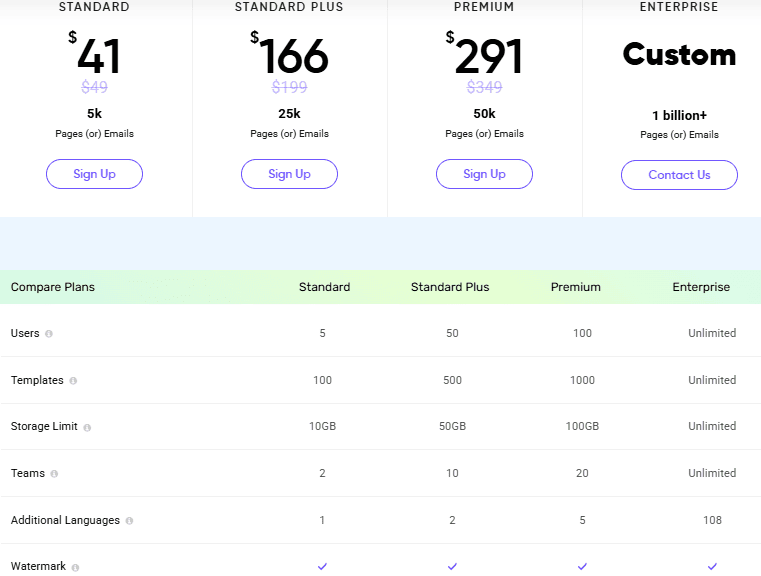
Visit Perfect Doc Studio for detailed pricing, features, integrations, and plan comparisons!
LinkSquares
LinkSquares is a contract automation platform that helps users draft, review, and manage contracts. Through AI-powered capabilities & tools, centralized repositories, and integrations, LinkSquare offers end-to-end CLM, but it focuses only on legal teams and their needs. There are four components to the platform: Analyze–centralizes contracts, Finalize–drafts and executes, Sign–E-signing capabilities, and finally LinkAI–offers actionable contract insights
So, if you’re looking for software exclusively for legal teams, this might be a good pick, but if you want something for other departments, like sales and finance, I suggest you look at alternatives.
Let’s look at the main offerings of LinkSquares
LinkSquare is known for its AI-powered contract review. Basically, it automates the first read of contracts, surfaces key data, and flags deviations or risks. It saves you a lot of time by simply providing instant insights into counterparty readiness and deviations.Linksquare supports collaboration by letting legal teams manage tasks in familiar environments by integrating with Microsoft Word and Salesforce. It also automates approval assignments and stakeholder notifications, so you are always up-to-date on everything.
To say nothing of the crisis response and compliance adaptation, incorporating standardized language into contracts using templates and access to contract terms. Any regulatory changes or due diligence requests will be met with actionable, organized contract data and upgraded standard clauses as regulations change.
LinkSquares’ proprietary LinkAI engine combines predictive and generative AI that handles everything from proactive insights to editing using a conversational interface. Since it was designed with legal-centered prompt optimization and has contextual understanding of sensitive legal matters, the agentic AI’s approach is one of a kind.
A secure repository that can build disclosure schedules, organize contracts, and related obligations.
While LinkSquare does a good job of securing contract storage and AI-powered review for legal teams, ultimately, its focus remains on legal teams. This can be kind of limiting if you want broader business adoption.
LinkSquares can only use documents from its template library or upload documents and include data fields. Its editor is limited when it comes to a flexible contract authoring environment. Want to build a template from scratch? You won’t have any luck there. Perfect Doc Studio offers a no-code,drag-and-drop designer to create custom contracts on a blank canvas.
LinkSquares only offers custom quotes, and you’ll have to contact them directly.
See what real users have to say about LinkSquares
Nick L, a Director of Contracting and Internal Counsel (a mid-market with 51-1000 employees)
What do you like best about LinkSquares?
Our experience with LinkSquares has been excellent across the board—from initial sales engagement to full onboarding and daily use of its core platform, including Analyze, Finalize,
and the Microsoft Word plugin. The product has delivered tangible improvements to our contract lifecycle. The Word integration has become essential to our redlining process. With our customized drafting rules in place, it flags problematic terms and suggests preferred language in real-time, enabling faster, more consistent edits without toggling between platforms.
What do you dislike about LinkSquares?
While we are very satisfied with the core platform, I would have appreciated more clarity around which features are included in our subscription tier. Specifically, functionality like risk scoring and private label email domains were referenced during our discovery and decision-making phases, and we initially understood these as standard platform features. Learning post-contract that they require additional costs or access to higher-tier subscriptions was a disappointment. These are highly relevant features that we expected to deploy early on.
ContractWorks
ContractWorks is cloud-based contract lifecycle management (CLM) software that takes a modern approach. It comes loaded with all the contract automation basics you might need. ContractWorks’s prominent features include rapid document drafting, approval workflows, and an intuitive interface. Adding to that, the fact that the pricing is affordable and for unlimited users makes it a community favourite.
Although slightly on the more expensive end, starting at $700 per month, the unlimited users is a kicker.
Are you in search of a solution with automation and collaboration capabilities without enterprise complexities or hidden fees? This is a worthy choice. However, it is not the future-proof solution you want when it comes to advanced document automation or dynamic automation.
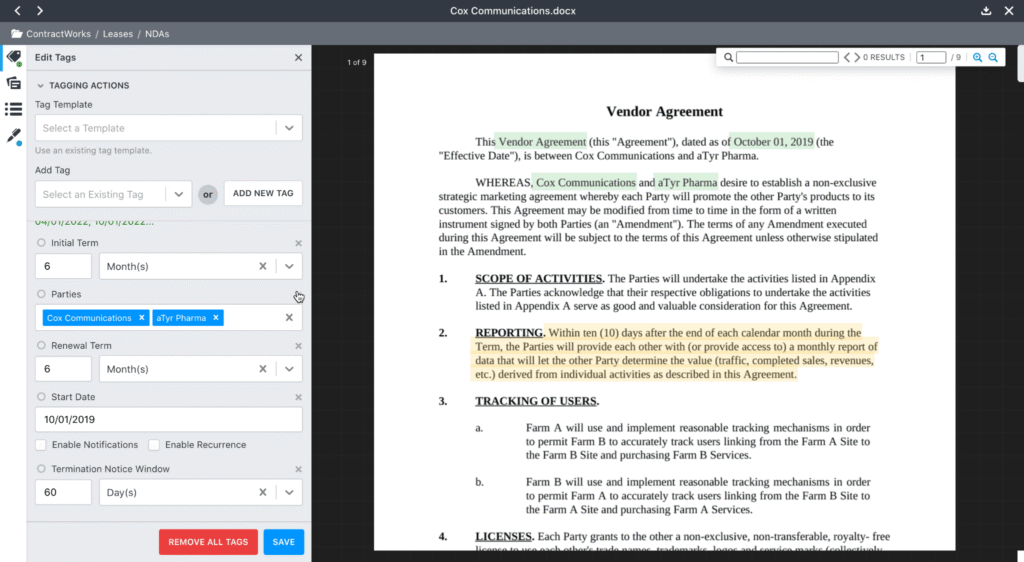
Here are some of ContractWorks’ strengths
The pre-approved templates only require you to enter contract information once, and the system populates all the related documents. It drafts contracts using customizable templates and conditional logic. ContractWorks enlists GPT-3 assistance to generate clauses and simplify legalese so even business teams won’t need to struggle with complex legal terms.
The collaboration capabilities are extensive. A native collaboration editor that not only allows third-party access without the creation of accounts but also tracks every change, comment, and redline with rollback options.
The OCR and AI-powered search features can help you locate specific clauses and terms. There’s a clause library that includes pre-approved and AI-generated clauses. ContractWorks also centralizes storage for all documents, protected by encryption and granular permissions.
Similar to Perfect Doc Studio, ContractWorks also integrates with e-signature platforms and supports system integrations like CRM, billing tools, and other collaboration tools.
The platform provides real-time updates, automatic reminders, and one-clock renewals. The approval workflows route contracts and clauses through multi-stakeholder approvals with automated triggers and notifications. While the amendment workflows tracks all the versions.
ContractWorks is built for simplicity–let me break it down for you. Although e-signature capabilities are offered, there’s a fixed number of licenses per plan, and you’ll need to pay extra for more users. Compared to other platforms that offer drag-and-drop template designers or no-code interfaces, ContractWorks still uses a form-based workflow, making it inconvenient to design complex templates or custom document layouts. Finally, while AI enhances finding information and suggests clauses, you won’t find the flexibility of “write-for-me” features like in Perfect Doc Studio, which can draft legal agreements from simple prompts.
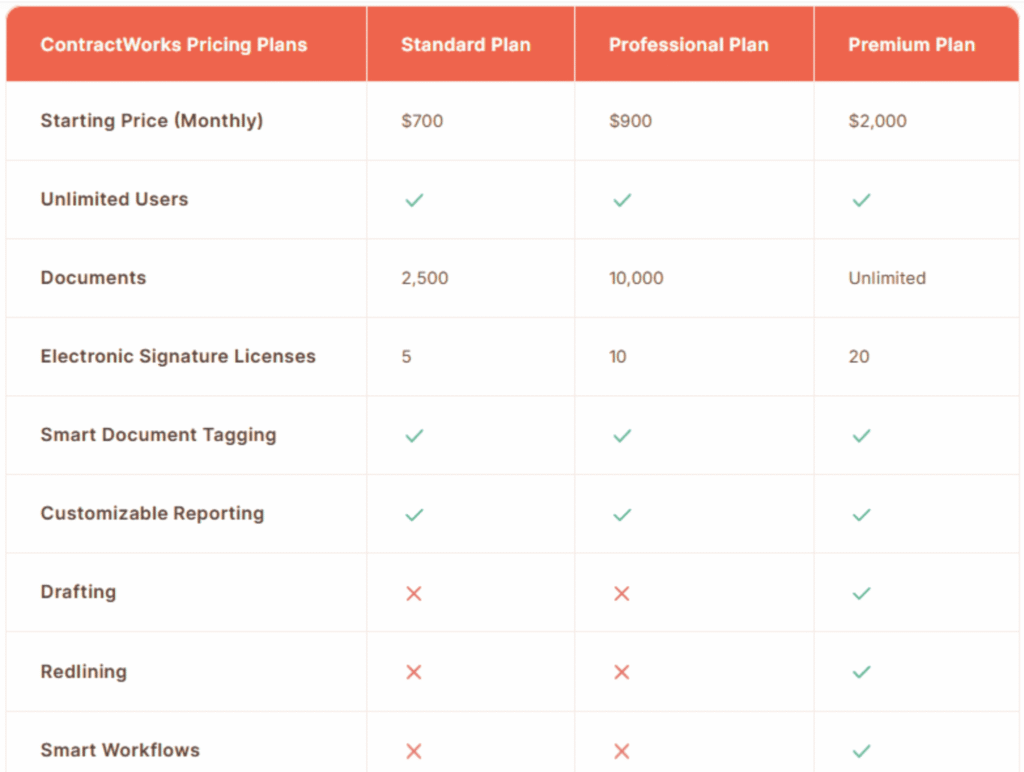
See what real users have to say about ContractWorks
Kara N, a Legal Assistant (a Mid-Market organization with 51-1000 employees)
What do you like best about ContractWorks, an Onit product?
The newer dashboard experience is more configurable, allowing users to tailor views by department, project, or risk category. Alerts now support multi-trigger logic (e.g., “notify me 90 days before AND if unexecuted”).
What do you dislike about ContractWorks, an Onit product?
While great for basic to mid-tier contract management, ContractWorks isn’t yet as advanced as full-scale CLM platforms (like Onit CLM or competitors like Ironclad) when it comes to automated clause negotiation, redlining, or workflow design. Also, the reporting functionality is good but could benefit from more drag and drop or no code dashboard creation. Exporting complex reports can require admin help or workarounds.
Ironclad
Ironclad is a popular contract management platform that delivers an all-in-one solution. It offers AI-powered capabilities with zero data retention, real-time collaboration, secure CLM infrastructure, multi-agent AI, and the newly introduced Jurist, an AI legal assistant. Ironclad brings everything from drafting and negotiations to signatures, the entire digital contract process. Ironclad will make you think you don’t need an army of legal experts.
Ironclad is renowned for its contract automation, considering the secure CLM infrastructure, but what about the depth in template design and multilingual support? If you need highly customized, visually rich documents in multiple languages, you may find Ironclad restricting.
Below are what Ironclad offers
Ironclad’s legal AI assistant, Jurist, instantly drafts emails, contracts, and redlines. Jurist will speed up contract review, spot risky clauses, and help you analyze contract data.
A no-code workflow builder can design, launch, and update contract processes in minutes. The rule-based approval workflows ensure contracts stay compliant and auditable. The documents come with in-browser collaboration options to draft, edit, and negotiate contracts with internal teams and external partners in Word or PDF.
Ironclad’s smart repository makes it easy for you to upload, scan, and even look up contracts. It’s quite nifty that there’s no need to manually tag your documents, and nothing actually gets lost.
Just like Perfect Doc Studio, Ironclad also integrates with third-party tools for e-signing capabilities. Because it is geared towards enterprises, it lacks the pricing that PDS offers (like PDS’s $0.008 per page), and for the same reason, it doesn’t offer a free version. However, it does offer a free 14-day trial, giving you access to core features, but advanced functionalities are unavailable.
Ironclad’s pricing is custom; you’ll have to contact them with the solutions you need, for instance, whether you want their contract management solution or their smart AI assistant. Then pick your partners, decide how you want to deploy, either with your own deployment team, theirs, or one of their trusted partners. Finally, you can add a little extra: unlock additional instances or enhance your team’s success plan.
See what real users have to say about Ironclad
Andrew Howard, a Senior Manager in Corporate Procurement within the Food & Beverages industry (a mid-market organization with 51-1000 employees)
What do you like best about Ironclad?
Ironclad offers a seamless blend of robust functionality, intuitive design, and exceptional customer support. The user experience is thoughtfully designed, catering to a wide range of skill levels. From legal professionals to business users with minimal technical background, Ironclad’s interface is accessible and easy to navigate. Its customizable workflows, automated approval routing, and powerful search capabilities make managing contracts efficient and transparent. The support team is consistently responsive, knowledgeable, and proactive.
What do you dislike about Ironclad?
Like any platform, Ironclad has its challenges. Feature rollouts can sometimes feel incomplete, with new capabilities occasionally lacking full functionality or requiring additional refinement post-launch. Additionally, training materials and documentation are not always up to date, which can create friction during onboarding or when exploring new features. Another consideration is cost scalability as user counts grow, the pricing model can become a significant investment, especially for larger or rapidly expanding teams.
DocuSign CLM
DocuSign has a high degree of flexibility, enterprise integrations, and AI-powered capabilities that automate every step of the contract lifecycle. Generation, negotiation, execution, and renewals are supported by DocuSign’s contract automation capabilities and enterprise security. Built-in e-signature, scalable workflows, and analytics are just some of the many standout features of DocuSign CLM.
DocuSign CLM has been around for a long time, so why exactly is it at the bottom of the list with various accolades to its name? As renowned as the software is, I’m ranking it based on a variety of factors that would make it ideal for an organization. You’ll know what I mean as you continue to read. However, even I can’t deny that years of industry experience and constant innovation have made DocuSign a trusted solution for organizations.
DocuSign’s features that I find noteworthy
DocuSign’s built-in AI engine, Iris, surfaces risks, identifies obligations, and accelerates contract reviews with natural language processing and smart recommendations. Iris powers DocuSign’s Intelligent Agreement Management (IAM) platform and other AI-driven features across the lifecycle.
The platform securely stores and manages contracts in a central repository, with options to look up contracts, clauses, and any other relevant information. The template and clause library manages reusable contract templates and clauses.
Like many other CLM tools, DocuSign also supports collaboration with internal and external stakeholders through redlining, commenting, and document sharing. Plus, all of these activities are tracked. Every move and every contract activity is automatically captured for audit trails.
Personally, one of DocuSign’s best features is its built-in eSignature platform. It’s secure and ensures contract execution remains compliant. After all, DocuSign was originally built as a digital signature solution.
Now, DocuSign, of course, covers the fundamentals one might need for an end-to-end CLM. A few points that made me rank DocuSign at the bottom of the list are its pricing, advanced no-code customization, and limited customer support. A simple search will reveal that DocuSign’s pricing is anything but transparent. The licensing fees are expensive, and the cost is based on the volume of activity.
Although it has no code functionality for designing and automating contract workflows, it doesn’t have the intuitiveness of the newer drag-and-drop platforms like Perfect Doc Studio or Panda Doc. Moreover, their customer support is enterprise-focused. These are some of the factors I believe push DocuSign down the list.
DocuSign offers custom quotes, and you must contact them directly.
See what real users have to say about DocuSign
A G2 review by a verified user in Information Technology and Services (Enterprise user with 1000+ employees)
What do you like best about DocuSign CLM?
The best thing about DocuSign CLM is its ability to automate and streamline the entire contract lifecycle, from creation and negotiation to approval and storage, which significantly reduces manual work and speeds up processes. I also appreciate its centralized repository, which makes it easy to track, search, and manage contracts, as well as its advanced AI features that help identify risks and extract key contract terms for better compliance and decision-making
What do you dislike about DocuSign CLM?
One drawback of DocuSign CLM is that customer support can sometimes be slow to respond or lacks the depth of expertise required for complex implementation issues, which frustrates users needing timely resolutions. Additionally, while the platform is generally intuitive once set up, some users find that updates or changes occur infrequently, leading to periods where the interface or certain processes feel less user-friendly or outdated until improvements are made.
A Checklist to Choose the Right Software
● Start by evaluating your contract requirements: the complexity, types, and volume of contracts. Some organizations might require NDAs, other sales agreements, or MSAs, while others might require all three.
● Look into the template and clause management options. These days no-code builders are all the rage, investing in an intuitive template builder, a flexible clause library, and a robust template library might help you in the long run.
● Choosing solutions with conditional logic for smart contracts will save you a ton of time. Dynamic content, fields, and clauses can address different client needs. AI-assisted drafting, auto-redlining, and intelligent recommendations for fields and clauses are a must-have. In fact, almost every modern tool comes with it.
● Always, and I mean always, verify legal and regulatory compliance–ESIGN, eIDAS, GDPR, and other local laws. Additionally, check if the solutions have strong security encryption, including RBAC and audit trails.
● It’s better to verify the availability of customer support and training resources, as well as the ease of use and customization, before you make the final call.
● Shortlist a few solutions, request demos or trials from the procurement team to experiment with the features. Read up on reviews (we have included the links in our blog) for insights into usability and support.
Want a comprehensive overview of template tools, document generation software, and more? Check out our practical insights!
FAQs
Contract automation software are digital tools that create, review, approve, and manage contracts by using templates, conditional logic, and integrations with other business systems. It eliminates repetitive tasks that HR, Sales teams, and other departments usually dread.
This is one of the benefits of contract automation software, they use standardized templates, dynamic fields, and conditional logi to reduce errors that are typically caused by manual entry. It also tracks critical dates and obligations, ensuring businesses meet compliance requirements such as GDPR and ESIGN.
Common contract types that can be automated include NDAs, sales agreements, employment contracts, service agreements, and lease agreements. Automation ensures that important clauses and terms are consistently included across all document types.
Contract automation software focuses primarily on streamlining the drafting and initial approval phases using automated templates and document assembly. In contrast, CLM software manages contracts from creation through execution, renewal, compliance tracking, and performance analysis.
Organizations implementing contract automation software have reported up to 25% reduction in administrative costs and a 50% to 70% decrease in contract review times. Automated workflows and AI-powered tools eliminate bottlenecks, allowing teams to focus on more complex legal and business matters.
AI in Customer Communication Management: Powerful Assistant, Not Decision Maker
AI is reshaping customer communication management, but not by replacing teams. This blog explores ho
What is transactional email? What is it used for?
Transactional emails are those that are sent in response to something a user does on a website or ap
The Real Guide to Salesforce OmniStudio Document Generation (What Nobody Tells You)
This blog dives deep into Salesforce OmniStudio Document Generation, debunking marketing hype and re




